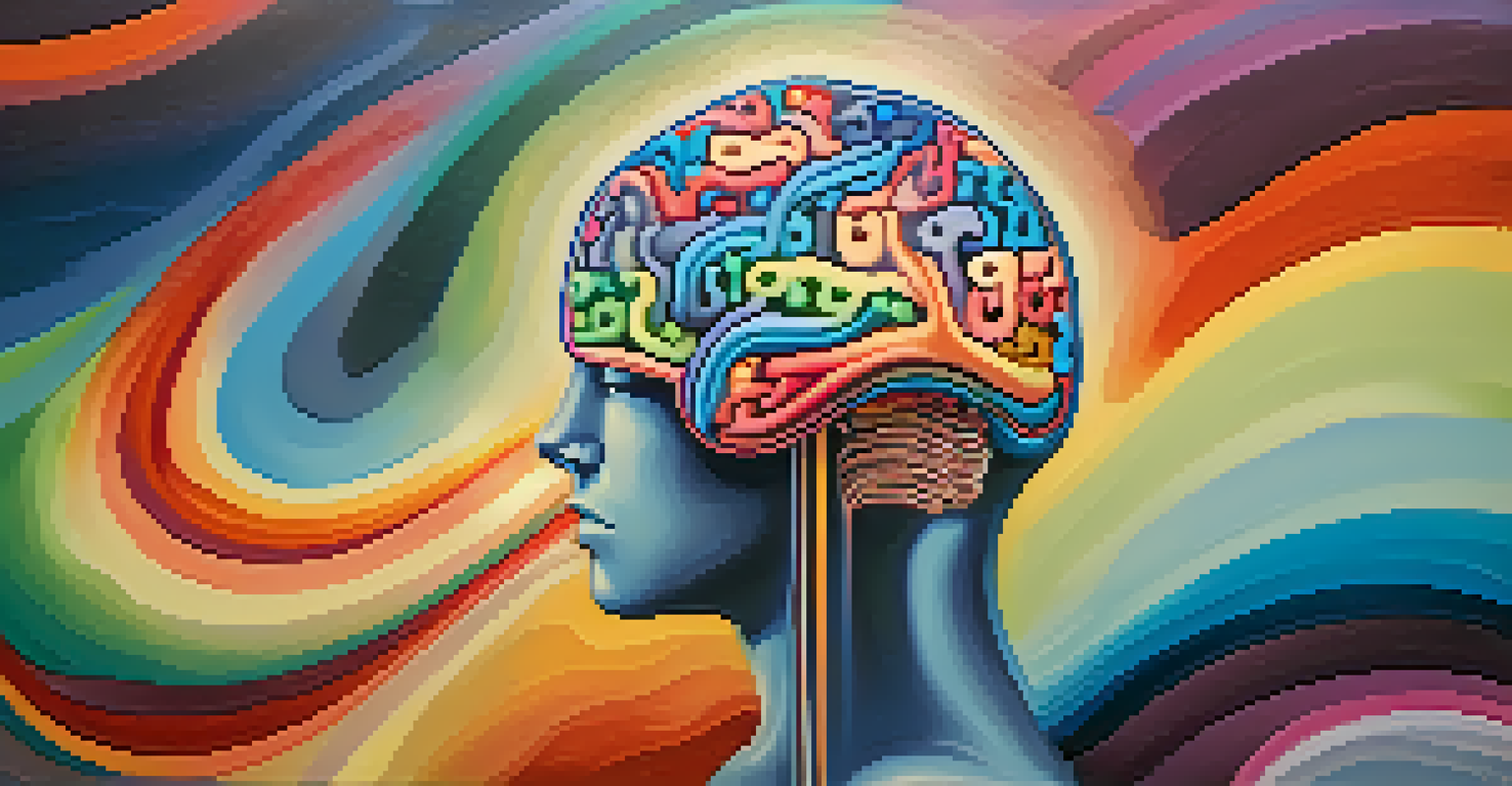Psychedelics and Trauma: Healing Through Altered States

Understanding Trauma: A Deep Dive into Its Impact
Trauma can be a heavy burden, often leaving deep emotional scars. It manifests in various forms, from anxiety to depression, affecting one's daily life and relationships. Understanding trauma is the first step towards healing, as it allows individuals to recognize the feelings and reactions tied to their experiences.
The greatest discovery of my generation is that a human being can alter his life by altering his attitude.
Many people carry trauma silently, often feeling isolated and misunderstood. This silence can perpetuate a cycle of pain and avoidance, making it difficult for individuals to seek help. Acknowledging the impact of trauma on mental health is crucial in reclaiming one's life and finding pathways to healing.
Healing from trauma isn't a one-size-fits-all process; it can take years and often requires a combination of therapies. Yet, with the rise of psychedelic therapy, new avenues are opening up for those seeking relief. Exploring these options can provide hope for a brighter future.
The Role of Psychedelics in Mental Health Treatment
Psychedelics, such as psilocybin and MDMA, have garnered attention in recent years for their potential therapeutic benefits. Research indicates that these substances can help break down mental barriers, allowing individuals to confront and process traumatic memories more effectively. This shift in perspective can be transformative for those struggling with deep-seated pain.

Unlike traditional medications that often focus on symptom management, psychedelics can promote profound emotional experiences. This can lead to insights and realizations that facilitate healing, making therapy more impactful. Many individuals report feeling lighter and more connected after undergoing psychedelic therapy.
Trauma's Impact on Mental Health
Trauma can lead to anxiety and depression, making understanding and addressing its effects crucial for healing.
The growing body of research around psychedelics is promising, with clinical trials showing significant improvements in PTSD and depression symptoms. While these treatments are not a magic bullet, they offer a new lens through which to view trauma recovery. As acceptance of these therapies increases, so does the potential for healing.
How Psychedelics Facilitate Emotional Release
One of the most compelling aspects of psychedelics is their ability to facilitate emotional release. Many individuals describe profound experiences during sessions, where they confront emotions they have long suppressed. This cathartic process can lead to a sense of liberation and newfound clarity.
Healing is not the absence of the pain. It’s the ability to make sense of it.
By creating a safe space for exploration, psychedelics help individuals process their trauma in a supportive environment. This is often accompanied by guided therapy, allowing participants to navigate their experiences with expert support. The combination of altered states and therapeutic guidance can amplify healing potential.
Emotional release can also lead to a deeper understanding of oneself and one’s trauma. This newfound insight fosters greater self-compassion and acceptance, essential components of healing. For many, this journey is not just about addressing past pain but also about embracing a brighter future.
The Science Behind Psychedelics and the Brain
Understanding how psychedelics work in the brain is key to grasping their healing potential. These substances interact with serotonin receptors, leading to altered perceptions and emotional shifts. This neurochemical activity can promote neuroplasticity, the brain's ability to reorganize and form new connections.
Research shows that psychedelics can temporarily disrupt rigid thought patterns associated with trauma. By encouraging flexibility in thinking, individuals can approach their memories with a fresh perspective. This is particularly beneficial for those who feel stuck in their trauma narratives.
Psychedelics Offer New Hope
Research shows that psychedelics can facilitate emotional release and provide transformative insights for trauma recovery.
Moreover, psychedelics may help to reduce fear responses associated with traumatic memories. By decreasing the emotional charge linked to these memories, individuals can engage with their past without becoming overwhelmed. This process opens the door to healing and integration.
Integration: The Key to Lasting Change
Integration is the process of making sense of psychedelic experiences and incorporating insights into daily life. It’s an essential step that ensures the benefits of the experience are not lost once the effects wear off. Working with a therapist during this phase can provide invaluable support.
During integration, individuals reflect on their experiences and how they relate to their trauma. This might involve journaling, therapy sessions, or community sharing circles, where participants can connect with others on similar journeys. It’s about turning insights into actionable steps toward healing.
Additionally, integration helps individuals build resilience and coping strategies. By applying lessons learned during psychedelic sessions, they can approach life’s challenges with a renewed perspective. This transformative process can lead to long-term emotional healing and personal growth.
Potential Risks and Considerations in Psychedelic Therapy
While the potential benefits of psychedelics are promising, it’s essential to approach these therapies with caution. Not everyone is a suitable candidate for psychedelic treatment, particularly those with certain mental health conditions. A thorough screening process is vital to ensure safety and efficacy.
Additionally, the setting in which psychedelics are consumed plays a significant role in the experience. A supportive, controlled environment is crucial for minimizing risks and maximizing healing potential. This is why guided sessions with trained professionals are recommended.
Integration Ensures Lasting Change
The process of integration helps individuals apply insights gained from psychedelic experiences to their daily lives for sustained healing.
Lastly, it’s important to remember that psychedelic therapy is not a cure-all. Healing from trauma is a complex journey that may require multiple approaches. Psychedelics can be a powerful tool in this process, but they work best when combined with traditional therapeutic methods.
Looking Ahead: The Future of Psychedelics in Healing
As research continues to unfold, the future of psychedelics in trauma therapy looks bright. Increased public interest and scientific support are paving the way for more clinical applications. This could lead to broader acceptance and availability of psychedelic therapies for those in need.
Moreover, as societal attitudes shift, we may see more integrative approaches in mental health care. Combining traditional therapies with psychedelic treatment could become a standard practice, offering comprehensive support for trauma recovery. This holistic approach could redefine mental health treatment as we know it.

Ultimately, the journey into the world of psychedelics and trauma healing is just beginning. With careful research, ethical practices, and a focus on patient safety, we can unlock the potential of these substances for profound healing. The horizon is filled with hope as we explore new pathways toward emotional wellness.